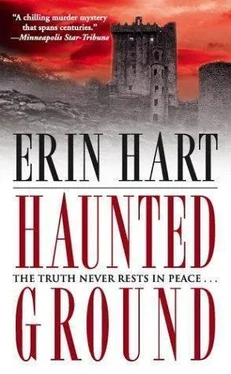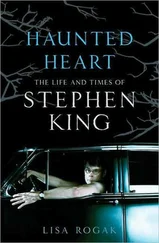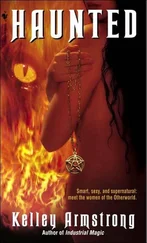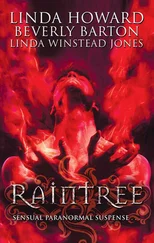“Fine old place,” he said. A harmless remark, but one glance at Una told him that it had tipped the scale.
Her words came in a torrent: “I suppose Devaney explained to you how the police have tried over and over again to pin the blame on Hugh for what happened? Of course there’s no proof, because he didn’t do anything. Just a lot of malicious talk from spiteful people with nothing better to occupy their minds. Whatever happened to Mina and the child, I’m certain Hugh had nothing to do with it. Anyone could see how he adored his family. The last two years have been awful, on top of everything else to have the police sniffing around asking questions, and the whole town watching, and waiting—” She stopped and took a breath, but seemed determined not to shed any tears. “Sometimes I really hate this feckin’ place.”
Why did he imagine that Una McGann had more than once been in the position of defending Hugh Osborne? “I suppose you’ve known him a long time?” He watched her face and posture soften.
“Not long, actually. He’s quite a bit older, and he was always away at school when we were growing up. But I got to know him when I was taking some classes at the university in Galway—he teaches geography there. I’d be hitching up to school the odd time and he’d give me a lift.”
“What were you studying?”
“Studio arts,” Una said. “I never finished.” Her tone suggested there might be more to the story, but he gathered it was not something she felt comfortable talking about. “You’re very good, listening to me go on,” she said.
“Did you know his wife?”
“Not really. Just to say hello. We used to pass along the road. I don’t know how Hugh has kept going at all.”
Cormac hadn’t reached a point where he’d begun to think of himself as a confirmed bachelor, but he had never been married, never been a father. He searched the windows of Bracklyn House for signs of life as he tried to put himself in Hugh Osborne’s place. Una followed his gaze, then looked down at her hands, doubled into fists in her lap.
He wanted to ask Una what she thought might have happened to Mina Osborne, but thought better of it. As they pulled away from the gate, Cormac wondered whether Una’s ministrations to Osborne out on the bog were anything more than neighborly concern. He remembered the fork twisting uneasily in her brother’s hands as well.
They had driven less than a quarter mile when Una spoke up: “You can turn in at the next gate on your left.” Cormac did as she instructed, and the jeep thundered over a cattle grid and up a steep drive. The McGann house was all but invisible from the road, tucked up against the side of the hill, and surrounded on three sides by pale green fir trees that brushed against its eaves. Like many old farmhouses, it was broad-shouldered and compact, close to the ground, with small-paned windows. The exterior had been freshly whitewashed, and the front door and window frames recently painted with glossy black enamel. An old-fashioned dog rose grew to one side of the door, and every flower bed looked lovingly tended. An ancient black car was parked on one side of the tin-covered shed in the haggard. Everything about this place suggested a family farm of thirty, perhaps even forty years ago.
“Brendan’s the man with the spade and the paintbrush here,” Una said. “He loves this place as if it were his child. He was that upset when my father replaced the old thatched roof—he slept out in the shed for three days. When they wanted to build a new house, he was like a briar. Wouldn’t hear of it.”
Cormac understood. A man who still insisted on cutting his own turf by hand wouldn’t exactly be a man who thrived on change. Una pushed open the shiny black front door. The house was divided in two equal halves, with the main hallway down the center. She led him into the kitchen, clearly the heart of the house. A heavy pine table stood in the middle of the room, its oilcloth heaped with onion skins and carrot peelings, and a dresser full of blue willow delft china stood beside the sink. The old stone fireplace still dominated the room, but it was cold at the moment. What heat there was apparently came from the enormous cooker that stood to one side of the fireplace, and the smell wafting from the cast iron pot that sat on top of it reminded Cormac that he was ravenous.
“You’ll have tea? Of course you will,” Una answered for him. “Fintan must have finished up the stew before he went out. The lads pretend to be useless, but they’re well able to fend for themselves.” She checked the kettle, and began to fill it at the sink, giving Cormac a chance to look around the space.
A narrow stairway led up to a closed loft that hung over the far side of the room. Cormac wondered if the bedrooms here were like those in his grandmother’s house: he pictured the horrid flowered wallpaper in musty rooms of his childhood, furnished with swaybacked metal beds and pictures of the Sacred Heart. Beneath the loft stood a second cooker, this one covered with white enamel buckets. In shelving all around it were large glass canisters, all labeled in the same neat hand. They contained mysterious organic substances that looked like bark, roots, and other dried plant material. He recognized pale green lichens, coppery onion skins, and the fibrous rhizomes of wildflowers, but others were strange in name and appearance: “Madder root,” “Cochineal,” and “Hypernic.” Hanks of yarn, some dyed, some natural, bawn-colored wool, were stacked in binlike baskets on another set of shelves. The low ceiling, coupled with the strange-looking contents, gave this place the atmosphere of a medieval alchemist’s lair. In the back corner of the kitchen, beneath the stairs, stood a large loom, its complicated system of warp and weft temporarily at rest. Hanging on the wall beside it was a length of cloth, a textured landscape in earthy tones reminiscent of lichens and sphagnum moss, with flecks of purple fox-glove and butterwort. Cormac’s eye was drawn to the subtle variations in color; he could make out the incomplete arcs of two circles, almost like the long-buried footprints of a pair of ringforts.
“This your work?”
“Yes, such as it is,” Una said, sounding somewhat preoccupied. She swept around him, scooping up a pile of papers, a jumper, and a newspaper from the well-worn sofa whose back rested against the front window.
“Please, do sit down, and forgive the mess. I’ve become a bit blind to it, I’m afraid.” What she called mess was the comfortable, familiar flotsam of everyday life, and it gave the room a sense of warmth and animation he suddenly felt his own orderly house in Ranelagh sorely lacked.
“What is all that?” he asked, gesturing toward the area under the loft.
“I suppose you could call it my studio. It used to be all very tidy when I was just doing the weaving. But since I’ve begun making my own dyes, it’s taken over the whole bloody kitchen. I’m hoping to get a bigger space soon.”
Cormac heard a commotion at the back door, and a small girl about five years old burst through the door, her round face circled by a corona of fair ringlets. She wore denim overalls, yellow wellingtons, and a tweedy green jacket with large red buttons. The child’s bright eyes traveled to Una, then to Cormac, and she darted out the back door again as quickly as she’d come in.
“Fintan, will you come on?” they could hear her plead in an exasperated tone, as though he’d been holding her up all day. “We’ve got company for tea.”
A clean-shaven young man in a baggy sweater smiled and nodded as he stuck his head in through the door, and set down a basket that seemed to be laden with moss and mushrooms, then turned to pull off his boots outside. “Stew should be nearly ready,” he said to Una through the open door.
Читать дальше











